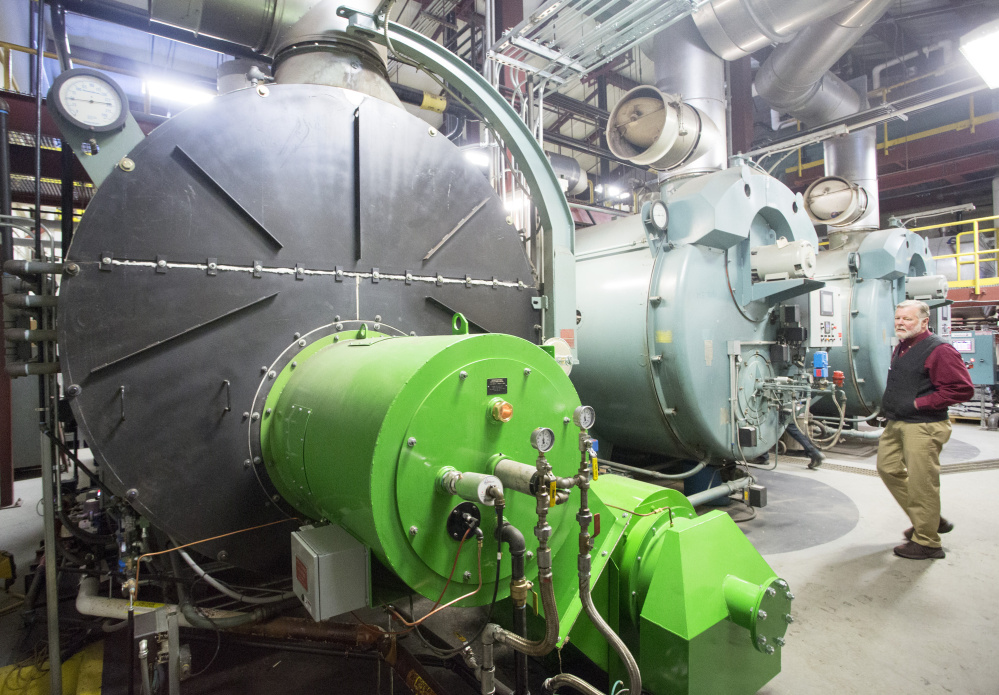A Canadian company that turns leftover wood from forestry operations into heating fuel has begun supplying Bates College in Lewiston and is seeking enough customers to build a production facility in Maine.
Ensyn Corp. is ramping up production of a proprietary biofuel it has made for more than 25 years at a small facility in Renfrew, Ontario.
Now the company, along with private partners and the governments of Canada and Quebec, is building a $78 million plant at Port-Cartier, Quebec. The Cote Nord facility is designed to produce 10.5 million gallons of oil a year from trees when it comes on line later this year to supply customers in eastern Canada and the northeastern U.S. Sales are aimed at large institutions, such as universities, state buildings and hospitals, that want to reduce the amount of climate-changing carbon dioxide they emit.
Biorefineries can create new markets for sustainable forestry, reduce fossil fuel dependence and support hundreds of jobs in the woods, in trucking and for plant operations.
“Maine would be an ideal place to locate a facility,” Lee Torrens, president of the subsidiary Ensyn Fuels Inc., told the Portland Press Herald.
Torrens declined to name specific companies or institutions, but said his company had been in contact with colleges, state officials and large woodland owners in Maine. Ensyn also has a $70 million loan guarantee from the U.S. Department of Agriculture to build a 20 million-gallon plant in Georgia’s Dooley County.
It sees the potential to build a biorefinery in Maine similar to the one planned in Georgia, Torrens said, if it can sign enough long-term contracts to total 7 million gallons or so of annual demand. Such a plant would need 400 tons a day of branches, limbs and low-grade wood from timber harvesting and processing operations, such as sawmills.
MILL CLOSURES OPEN NEW DOORS
The company’s interest comes as five paper mills have closed in the past three years, removing thousands of jobs and an estimated $1.3 billion from the state’s economy. That has created a surplus of wood and a broad selection of industrial sites in rural Maine. These factors are starting to attract investors.
Currently, a group of energy developers associated with Stored Solar LLC, a company that restarted two idle wood-fired power plants in Jonesboro and West Enfield, is trying to market Maine’s obsolete biomass plants and shuttered paper mills. They are rebranding these sites as world-class assets that can become testing grounds for a new manufacturing economy based on sustainably harvested wood. Developers envision bioenergy parks, where all parts of a tree are used to make electricity, fuel, food, material and other things, eventually replacing similar products made from petroleum.
Ensyn has experience making fuel, food ingredients and chemicals at its Ontario plant. Since 2014, it also has been selling its oil substitute, which it calls Renewable Fuel Oil, or RFO, to the district heating plant in Youngstown, Ohio, and Memorial Hospital in North Conway, New Hampshire.
“We have a technology that works,” Torrens said. “It’s not experimental.”
The fuel currently is cost-competitive with natural gas and heating oil, he said, with the aid of a federal subsidy meant to reduce petroleum dependence. Called the Renewable Fuel Standard program, it’s run by the Environmental Protection Agency and has strong political support in the Midwest, where it drives a corn-based ethanol industry. It’s unclear how the subsidy might change under the Trump administration.
For now, with petroleum prices low, the cost of the tree-derived oil for Memorial Hospital is just about even with heating oil, said Doug Walrath, the facilities manager.
This is the third winter that the 25-bed health care center is burning the fuel. It has two boilers and is using the biofuel in one converted unit to meet 75 percent of the hospital’s heating needs.
Performance is good, Walrath said, and Ensyn has been responsive in troubleshooting early problems. The fuel is proving less expensive than converting the heating system to wood chips, which is what the hospital had been considering.
AT BATES, GOOD RESULTS SO FAR
Bates College was looking into wood chips two years ago when John Rasmussen, the school’s energy director, was contacted by Ensyn. He ultimately determined the college could achieve similar climate-change emissions reductions with the liquid fuel, for far less money.
The college had three boilers that can burn natural gas or oil. Last year, the college spent $1.1 million to convert one unit from gas to burn biofuel and install a 20,000-gallon tank next to the campus steam plant. In mid-January, the new boiler began using biofuel. So far, so good, Rasmussen said during a recent tour.
“They’ve been burning this stuff for 25 years, so there shouldn’t be many surprises,” he said.
Bates warms just over 1 million square feet of interior space on its main campus, and Rasmussen expects to burn 700,000 gallons of biofuel this winter. On average, that will satisfy 70 percent of the heating demand.
Rasmussen declined to discuss the school’s seven-year supply contract, but said he expects the investment to pay for itself within five years. He may also consider converting a second boiler.
A limiting factor now is that the fuel is being trucked from Ontario, an eight-hour delivery drive required almost every day during the winter. The Cote Nord plant in Quebec is even farther away.
So Rasmussen is hoping that enough Maine institutions make the choice he made, to give Ensyn a critical mass of volume to site a plant in the state. He said he has been in contact with colleagues at Gould Academy in Bethel and Bowdoin College in Brunswick, who are studying Ensyn’s biofuel option.
“We want that plant right here in Maine,” he said.
Tux Turkel can be contacted at 791-6462 or at:
tturkel@pressherald.com
Twitter: TuxTurkel
Send questions/comments to the editors.






Comments are no longer available on this story